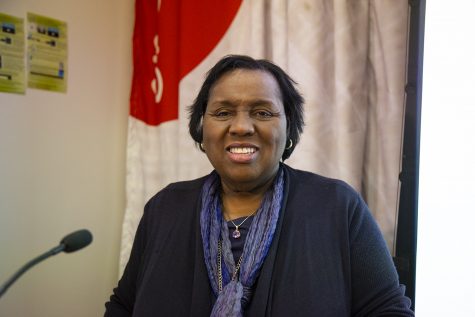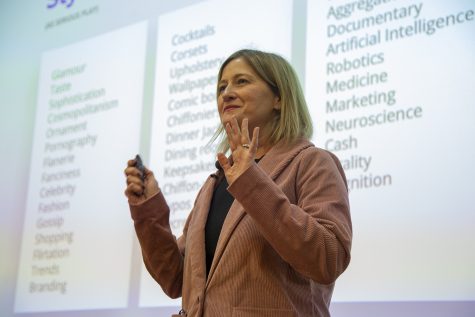Dean candidates discuss their vision for the School of Fine and Performing Arts
January 21, 2020
After more than a year of an interim dean in the School of Fine and Performing Arts, the college is conducting an internal search for a permanent replacement.
The role was formerly occupied by Onye Ozuzu, who left the college in August 2018 to become dean of the University of Florida College of the Arts. Since, Rosita Sands has been operating as the interim dean of the school.
Sands is one of two finalists for the dean position, along with Colbey Reid, chair of the Fashion Studies Department.
In a two-day candidate presentation on Tuesday, Jan. 14 and Wednesday, Jan. 15 in the Ferguson Auditorium, 600. S. Michigan Ave., each finalist spoke on their respective day about two points: Why they are interested in the position of dean, and their vision for the School of Fine and Performing Arts, as well as the college.
In attendance for both presentations was President and CEO Kwang-Wu Kim, who said in an interview with the Chronicle that he is looking for a dean with experience and a balanced approach.
“A dean must be steady in the face of challenges and motivated by values that align with the institution’s values,” Kim said.
Kim added a dean should be both practical and inspirational, staying focused and hopeful.
Following the presentations, faculty and staff completed online surveys evaluating each candidate’s performance. There is no set date for when the dean position will be filled, according to Senior Vice President and Provost Marcella David.
Rosita Sands

Rosita Sands, interim chair dean of the School of Fine and Performing Arts, is one of two candidates for the full-time dean position.
With more than a year as interim dean under her belt, Sands is no stranger to the dynamic and vision of the School of Fine and Performing Arts—and with the desire to fill the role full-time, Sands wants to expand the boldness and innovation of curriculum and goals for the school, she said during her Tuesday, Jan. 14 presentation.
Sands came to Columbia in 2000 where she has been the associate director and then executive director of the Center for Black Music Research, as well as the associate chair and interim chair of the Music Department before becoming chair of the department in 2016.
“The entirety of my experience, training and commitment to the institution’s mission and goals will enable me to [fill this role] effectively,” Sands said.
For Sands, an innovative curriculum would deliver students with more than just one approach toward their goals. She said her ideal curriculum is one that is bold and challenges the “status quo.”
To put the curriculum in perspective, Sands said the Dance Department is an example of a curriculum that is already going in the right direction. She said most institution’s dance curriculum core is solely based on European ballet, however Columbia has championed the inclusion of West African dance into its core.
Although Sands has ideas for how to implement this form of innovation into other departments and programs, she said it needs to come from the specific departments because they know their discipline best.
Along with goals of continuing the momentum of the “significant work” the school has accomplished over the past three years, Sands said her vision for the college is to be known as the “school of choice.” She said this will require the school’s programs to provide modern and contemporary training within the context of a liberal arts education.
“We are, and will continue to be, known for cutting-edge programs across disciplinary areas of our curriculum,” Sands said.
To enhance this, Sands said there needs to be continued work in confronting the challenges and opportunities at the college for “deeply embedding the principles and concepts of diversity and inclusivity in a transformative manner” across all disciplines, which she said will benefit all students.
Colbey Reid

As part of the college’s dean search, Reid gives a presentation Wednesday, Jan. 15 on why she is the best candidate for the dean position, and what she would bring to the school.
As chair of the Fashion Studies Department, Reid said she does not want to be dean of the School of Fine and Performing Arts simply to advance through the ranks at the college. Rather, she has ideas and goals that are larger than her current role can reach.
“I am quite energized by thinking through traditional arts and humanities problems in business contexts,” Reid said during her Wednesday, Jan. 15 presentation.
Reid came to Columbia to become a department chair in June 2017 and, before that, was an associate professor and the director of Consumer Innovation Consortium at York College of Pennsylvania.
Reid gave a number of in-depth examples as to what she wants to implement in the school if appointed as dean, which were split into four categories: image, money, network and people.
For image, Reid said the school, and the college as a whole, can start rethinking the college’s “brand” by “skipping school and starting a movement,” which she said means to step outside of the college’s regular curriculum—especially given the college’s mission and position to shape an artistic movement.
She said the college needs to do something aesthetically distinct, which would bring all forms of art together. She suggested the introduction of a design core to the college’s curriculum, which would address society’s desire for visual learning and disciplines.
Regarding money, Reid said she wants to implement business models that would generate revenue for projects and introduced the idea of “Columbia Collaboratories,” which would create partnerships with businesses and the production of different projects.
Reid pointed to the Fashion Lab, which was launched a year ago, which has raised nearly $122,500 in revenue. Reid said she wants to introduce more labs of this kind to bring different disciplines together from the college’s three schools, including the School of Liberal Arts and Sciences and the School of Media Arts.
“If we only ever talk about what the future is or could be in hypothetical or theoretical terms, we will never get down to the business of actually making it,” Reid said.







